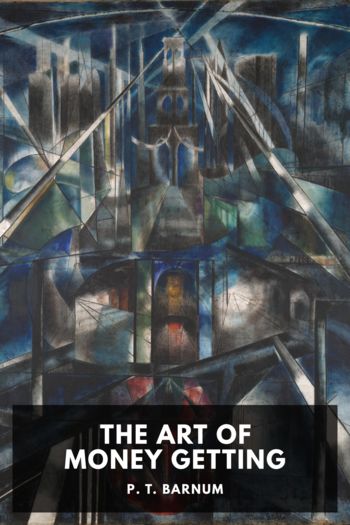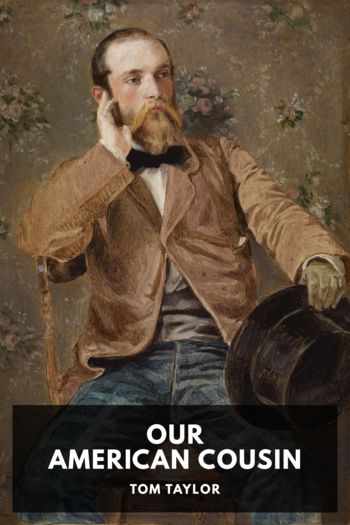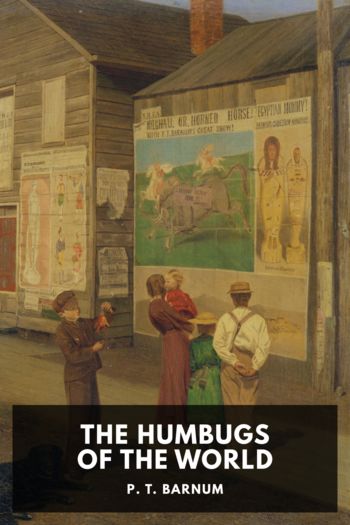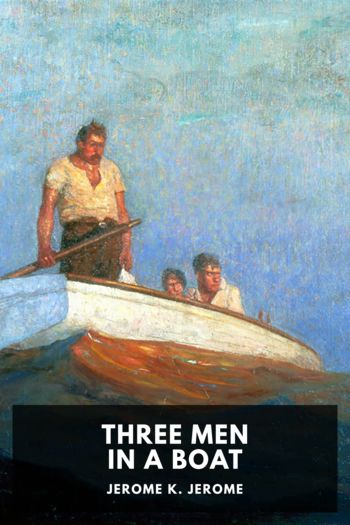Struggles and Triumphs by P. T. Barnum (love novels in english TXT) 📕

- Author: P. T. Barnum
Book online «Struggles and Triumphs by P. T. Barnum (love novels in english TXT) 📕». Author P. T. Barnum
During one of our evening performances at Francisville, Louisiana, a man tried to pass me at the door of the tent, claiming that he had paid for admittance. I refused him entrance; and as he was slightly intoxicated he struck me with a slung shot, mashing my hat and grazing what phrenologists call “the organ of caution.” He went away and soon returned with a gang of armed and half-drunken companions who ordered us to pack up our “traps and plunder” and to get on board our steamboat within an hour. The big tent speedily came down. No one was permitted to help us, but the company worked with a will and within five minutes of the expiration of the hour we were on board and ready to leave. The scamps who had caused our departure escorted us and our last load, waving pine torches, and saluted us with a hurrah as we swung into the stream.
The New Orleans papers of March 19, 1838, announced the arrival of the “Steamer Ceres, Captain Barnum, with a theatrical company.” After a week’s performances, we started for the Attakapas country. At Opelousas we exchanged the steamer for sugar and molasses; our company was disbanded, and I started for home, arriving in New York, June 4, 1838.
VII At the Foot of the LadderDisgust at the Travelling Business—Advertising for an Associate—Rush of the Million-Makers—Counterfeiters, Cheats and Quacks—A New Business—Swindled by My Partner—Diamond the Dancer—A New Company—Desertions—Successes at New Orleans—Tyrone Power and Fanny Ellsler—In Jail Again—Back to New York—Acting as a Book Agent—Leasing Vauxhall—from Hand to Mouth—Determination to Make Money—Fortune Opening Her Door—The American Museum for Sale—Negotiations for the Purchase—Hopes and Disappointments—The Train Laid—Smashing a Rival Company.
I have said that the show business has as many grades of dignity as trade, which ranges all the way from the mammoth wholesale establishment down to the corner stand. The itinerant amusement business is at the bottom of the ladder. I had begun there, but I had no wish to stay there; in fact, I was thoroughly disgusted with the trade of a travelling showman, and although I felt that I could succeed in that line, yet I always regarded it, not as an end, but as a means to something better.
Longing now for some permanent respectable business, I advertised for a partner, stating that I had $2,500 to invest and would add my unremitting personal attention to the capital and the business. This advertisement gave me an altogether new insight into human nature. Whoever wishes to know how some people live, or want to live, let him advertise for a partner, at the same time stating that he has a large or small capital to invest. I was flooded with answers to my advertisements and received no less than ninety-three different propositions for the use of my capital. Of these, at least one-third were from porterhouse keepers. Brokers, pawnbrokers, lottery-policy dealers, patent medicine men, inventors, and others also made application. Some of my correspondents declined to specifically state the nature of their business, but they promised to open the door to untold wealth.
I had interviews with some of these mysterious million-makers. One of them was a counterfeiter, who, after much hesitation and pledges of secrecy showed me some counterfeit coin and bank notes; he wanted $2,500 to purchase paper and ink and to prepare new dies, and he actually proposed that I should join him in the business which promised, he declared, a safe and rich harvest. Another sedate individual, dressed in Quaker costume, wanted me to join him in an oat speculation. By buying a horse and wagon and by selling oats, bought at wholesale, in bags, he thought a good business could be done, especially as people would not be particular to measure after a Quaker.
“Do you mean to cheat in measuring your oats?” I asked.
“O, I should probably make them hold out,” he answered, with a leer.
One application came from a Pearl Street wool merchant, who failed a month afterwards. Then came a “perpetual motion” man who had a fortune-making machine, in which I discovered a mainspring slyly hid in a hollow post, the spring making perpetual motion—till it ran down. Finally, I went into partnership with a German, named Proler, who was a manufacturer of paste-blacking, waterproof paste for leather, Cologne water and bear’s grease. We took the store No. 101½ Bowery, at a rent (including the dwelling) of $600 per annum, and opened a large manufactory of the above articles. Proler manufactured and sold the goods at wholesale in Boston, Charleston, Cleveland, and various other parts of the country. I kept the accounts, and attended to sales in the store, wholesale and retail. For a while the business seemed to prosper—at least till my capital was absorbed and notes for stock began to fall due, with nothing to meet them, since we had sold our goods on long credits. In January, 1840, I dissolved partnership with Proler, he buying the entire interest for $2,600 on credit, and then running away to Rotterdam without paying his note,





Comments (0)